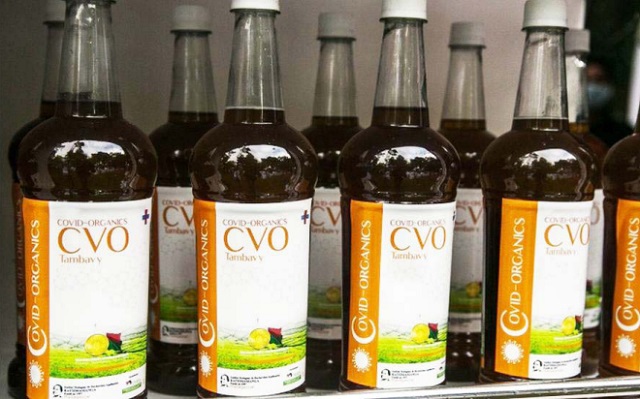
Challenges of herbal medicine
Uganda is not the only country thart has attempted to push for herbal remedies for COVID-19. In October 2020 the Indian Ocean island country of Madagascar opened a factory of herbal medicine called Pharmalagasy. It was to produce COVID-19 preventive drugs.
President Andry Rajoelina said at the time Madagascar was the only African country to have conducted three clinical trial protocols against coronavirus.
Earlier in April 2020 Madagascar had launched an organic herbal concoction called Covid-Organics (CVO) which it said could prevent COVID-19 and cure patients suffering from the novel coronavirus. The concoction which was flagged as a “miracle remedy” was also said to cure dengue fever, bilharzia, and stomach aches among others.
A few days after its official launch, it was given out free of charge across the country and distributed through schools.
Despite questions about its efficacy and safety, the Madagascar “cure” was embraced by COVID-19 vaccine skeptics like then-President of Tanzania John Pombe Magufuli.
At the time, the World Health Organisation (WHO) issued a statement saying it welcomes innovations around the world including repurposing drugs, traditional medicines and developing new therapies in the search for potential treatments for COVID-19.
But it warned that many plants and substances are being proposed without the minimum requirements and evidence of quality, safety and efficacy.
“The use of products to treat COVID-19, which have not been robustly investigated can put people in danger,” the WHO said.
Despite Madagascar aggressively pushing its so-called miracle remedy, its COVID-19 situation continued to worsen. The country was under curfew early this June. With a population of 29 million, it was reporting about 50 new cases and about 10 deaths daily and over 40,000 cumulative confirmed cases.
Researchers in herbal medicine say the evaluation of efficacy and safety of the products through registration and regulation “presents important challenges”.
This is mainly because herbal medicines have two special characteristics which distinguish them from chemical drugs; herbal medicines use crude herbs and they are used over a prolonged period.
The process is complicated because a single herb may contain a great many natural constituents and a combination of herbs even more. Experts say to isolate each active ingredient from each herb would be immensely time-consuming at unsupportable cost, and is almost impossible in the case of preparations.
That is why, despite the use of herbal medicines over many centuries, only a relatively small number of plants have been studied for possible medical applications. Safety and efficacy data are available for an even smaller number of plants, their extracts and active ingredients and preparations containing them.
Based on this, it is not surprising that the government of Uganda many refuse to endorse a herbal medicine or drug and yet not move aggressively to stop its use by the public or its sell by the herbalists or developers.
Instead, the government has been taking baby-steps to regulate the herbal medicine industry. In May the government through its Directorate of Industrial Training (DIT) issued assessment and training packages for herbalists as part of the efforts to formalise the training of processors of herbal medicines.
The National Drug Authority (NDA) and Natural Chemotherapeutics Research Institute (NCRI) developed the training package that falls under Uganda Vocational Qualifications. They worked with associations of traditional herbalists across the country.
In April the National Drug Authority (NDA) announced plans to register herbal medicine practitioners across the country in a bid to ensure the quality and safety of herbal medicine.
“It’s the cardinal role of the National Drug Authority to protect human and animal population from poor quality, unsafe and infective drugs,” said Michael Mutyaba, the manager National Medicines at NDA.
Mutyaba said research by the Ministry of Health showed that about 60% of Ugandans consume herbal medicine.
He said NDA had at the time registered and cleared for public use over 180 locally made herbal medicines.
But in October 2020 the Masaka District Security Committee clamped down on the operations of a herbal products business called Superlife International. They accused it of fleecing members of the public their hard-earned cash and violating Covid19 preventive guidelines.
But the company denied any wrongdoing and said customers were attracted by the efficacy of their health products.
****
 The Independent Uganda: You get the Truth we Pay the Price
The Independent Uganda: You get the Truth we Pay the Price


